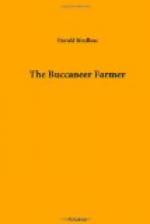“I imagine you can see an opportunity of selling the right to cut it,” Osborn sneered.
“We are willing to sell at the buyers’ price. Anybody who can’t pay may have the peat for nothing. None of the day laborers has paid us yet and none shall be forced to pay.”
Osborn did not know whether he could believe this statement or not, but he said ironically, “Then it looks as if you were generous! However, you are not a friend of my agent’s and no doubt see a chance of making trouble. When you meddle with my tenants you play a risky game, and they may find they were foolish to join you.”
One of the farmers who had stood quietly by Peter Askew looked up with a slow smile; another’s weather-beaten face got a little harder. They were seldom noisily quarrelsome, but they were stubborn and remembered an injury long. Peter, however, interposed:
“We won’t fratch; there’s not much in arguing. You can beat moor t’ither side o’ green road. Good day to you!”
He spoke to the horses and the sledge lurched forward with its chocolate-colored load. The other teams strained at the chains; there was a beat of hoofs, and the row of sledges moved noisily away. Osborn waited for a few moments, but his face was very red when he went back to the butts. The farmer’s refusal to dispute with him was galling. For all that, he must try to find his friends some sport, and after consulting with his gamekeeper sent the beaters on across the moor.
The new drive was not successful, and in the evening the party came down the hill with a very poor bag. When they reached the Redmire wood Osborn stopped beside a broken hedge. Red beeches shone among the yellow birches and dark firs, the sun was low and its slanting rays touched the higher branches, but the gaps between the trunks were filled with shadow. A few bent figures moved in the gloom, and Osborn frowned when three or four children came down a drive, dragging a heavy fallen bough. An elderly woman with a sack upon her back followed them slowly, and it was obvious that cottagers from Allerby were gathering fuel.
“Confound them! This is too much!” he exclaimed and beckoned his gamekeeper. “If that is Mrs. Forsyth, tell her to come up.”
The woman advanced and rested her sack upon the hedge. Her wrinkled face was wet with sweat, but she did not look alarmed.
“Eh!” she said, “sticks is heavy and I’m none so young as I was.”
“You have no business in the wood,” said Osborn sternly.
“There’s nea place else where we can pick up sticks.”
“That is your affair. You know you’re not allowed to gather wood in my plantations.”
“We canna gan withoot some kindling; when you canna keep it dry, peat is ill to light. Terrible messy stuff, too, and mak’s nea end o’ dirt.”
The children came up and when they stood, open-mouthed, gazing at the party one of the sportsmen laughed.




